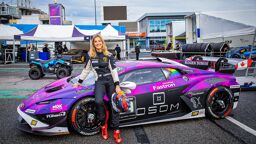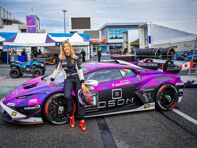When you think of a stereotypical NASCAR fan, it’s probably an older, Southern, conservative white guy. NASCAR isn’t seen as having a diverse or accepting fan base.
The stereotype exists for a reason. Bubba Wallace, NASCAR’s only Black driver, gets consistently booed at most tracks (unless he is wrecking, then they cheer). Teams like Mike Harmon Racing (who follow me on Twitter for reasons I don’t understand) and Go Fas Racing that ran cars with Trump 2020 paint schemes don’t help the stereotype that there is only one acceptable NASCAR political stance.
NASCAR’s record on social issues is questionable at best. This stretches from 1964 — when NASCAR created a scoring error to prevent giving Wendell Scott, an African-American driver, his first win (they later corrected the error and gave Scott the win) — to 2020, when Donald Trump, running for reelection, served as the grand marshal for the Daytona 500.
Just months later, former Chip Ganassi Racing driver Kyle Larson used a racial slur on a livestream. And that’s just the tip of the iceberg. From union-busting that spanned across decades to allowing a college that supports conversion therapy to sponsor a driver, NASCAR’s list of missteps on political issues isn’t short.
Get off the sidelines and into the game
Our weekly newsletter is packed with everything from locker room chatter to pressing LGBTQ sports issues.
So why would I — a queer leftist teenager from the Northeast who was a high school swimmer and thinks that AOC should be our next president — be a huge NASCAR fan? It’s simple — I love the fast cars, I love the competition, and most importantly, I value the friends that I’ve met through NASCAR. I’ve gotten lots of hate from the core fan base, but I’ve also met lifelong friends and rediscovered one of my favorite childhood hobbies.
I have to give credit to NASCAR for trying to improve its record on diversity and inclusion. NASCAR started its Drive for Diversity program in 2004 to try to bring female and minority drivers into the sport. Wallace and Daniel Suárez are both NASCAR winners who have come through the Drive for Diversity program. Other notable drivers to come through the program include Natalie Decker, Ryan Vargas and Gracie Trotter. Wendell Scott, NASCAR’s first Black winner, was inducted into NASCAR’s Hall of Fame in 2015.
Last season, NASCAR made the long-overdue decision to ban the Confederate flag from races. Also last season at Talladega, after a noose was allegedly found in Wallace’s pit box (an FBI investigation later concluded that there was no ill intent), the garage united behind Wallace in a display that moved him to tears. At that same race, fellow driver Denny Hamlin ran a paint scheme for the National Civil Rights Museum. Wallace also ran a Black Lives Matter paint scheme at Martinsville.
Devon Rouse, who plans to make a start in NASCAR’s Camping World Truck Series at Knoxville later this season, will become NASCAR’s first openly LGBTQ driver since 2003 (and second ever).
Finally, on April 15, NASCAR announced partnerships with six different groups, including the Urban Youth Racing School in Philadelphia, the Women’s Sports Foundation (a nonprofit dedicated to increasing female involvement in sports) and the Trevor Project (a nonprofit suicide prevention group for LGBTQ+ youth). This announcement was huge for marginalized NASCAR fans, especially LGBTQ NASCAR fans, as it seemed NASCAR was finally putting in the work to dispel the old stereotypes and drive away bigoted fans.
I’ve been a NASCAR fan almost my whole life. My dad introduced it to me at a very young age. I was a huge Jeff Gordon fan. When he retired after the 2015 season, I drifted away from the sport. I was still a casual fan, but I almost never watched races and I didn’t really have a driver I was attached to.
But when Covid-19 hit, I was incredibly bored and tried to find something to do. And I once again fell in love with the sport that I had watched so much when I was younger. It took me a few months to find a favorite driver again.
I rooted for Chase Elliott for a while just because he was the driver who replaced Jeff Gordon, but I eventually became a Bubba Wallace fan. I loved his personality, his aggressive driving style, and most importantly, his willingness to stand up for what was right. It was a tough season for Wallace, as Richard Petty Motorsports, the team that he drove for in the 2020 season, had been a mid-pack team for decades. But I had finally found a new driver to root for, and I was watching races again.
Since I rediscovered NASCAR, I’ve become a huge fan. I always try to watch the races, and when I’m not able to, make sure to keep track of updates on social media. When there aren’t races, I talk with my friends about anything vaguely NASCAR related.

Whether it’s statistics, NASCAR video games, or just talking about drivers (and how attractive some of them are — mostly Alex Bowman), I rarely have a conversation with a friend where NASCAR isn’t mentioned in some way. I’ve started collecting some more merchandise — a hat or two, half a dozen shirts, but mostly diecast cars. In the past year my collection has grown substantially.
I also discovered a community that I had no idea existed. On social media, I’ve met an incredibly diverse base of NASCAR fans. They were young, progressive, incredibly diverse, and I’ve met too many friends to count in the past year. Of course, the stereotypical NASCAR fans hate us — getting called slurs happens sometimes, but the block button exists for a reason. That bigoted part of NASCAR fans is largely derided by the rest of us. A growing part of the NASCAR fanbase is the opposite of the stereotypes — young, progressive, diverse and, in many cases, queer.
A few months ago, when Rouse, an openly gay dirt racer, announced that he’d be running in the NASCAR Camping World Truck Series, his announcement was flooded with support and celebration from queer NASCAR fans. I had never heard of him before, but I was an instant fan. To have an openly LGBTQ driver in the sport that I’d loved my whole life, just months after coming out, was amazing.
For all of its missteps and mistakes, I still love NASCAR, and I still love (many of) its fans.
Jordan Fixsen, 18, will graduate from Penfield High School in the summer of 2021. They were a member of the school’s swimming and outdoor track teams. They have committed to Alfred University to swim and study mechanical engineering. You can reach him at [email protected], or on Instagram or Twitter. You read Jordan’s coming out story.
Story editor: Jim Buzinski







































